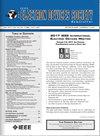基于深度学习的逆变电路单事件效应预测
IF 2.4
3区 工程技术
Q3 ENGINEERING, ELECTRICAL & ELECTRONIC
引用次数: 0
摘要
全贫绝缘体上硅(FDSOI)技术可以非常有效地解决短通道效应,具有低功耗、低电压的特点,可以改善器件的亚阈值特性。此外,FDSOI器件具有良好的抗辐射性能,已成为器件研究领域的重要研究对象。单事件效应(SEE)是FDSOI器件抗辐射性能的重要指标。目前,FDSOI器件的SEE研究一般采用重离子辐照实验和TCAD软件模拟。以FDSOI技术为例,提出了一种基于深度学习的器件建模与性能预测的研究方法。该方法预测暂态电流峰值$(I_{peak})$的准确度为96.45%,总电荷收集值$(Q_{total})$的准确度为97.86%,漏极暂态电流脉冲确定系数(It)为0.97717。该方法可以明显提高仿真速度,降低计算成本,为FDSOI器件的研究提供了一种新的可行方法。本文章由计算机程序翻译,如有差异,请以英文原文为准。
Prediction of Single Event Effect in Inverter Circuit Based on Deep Learning
Fully Depleted Silicon on Insulator (FDSOI) technology can solve the short channel effect very effectively, with low power consumption, and low voltage, and can improve the subthreshold characteristics of the device. In addition, FDSOI devices have good radiation resistance, which has become an important research object in the field of device research. Single event effect (SEE) is an important index of radiation resistance of FDSOI devices. At present, the research on SEE of FDSOI devices typically employs heavy-ion irradiation experiments and TCAD software simulations. Taking FDSOI technology as an example, this paper presents a research method of device modeling and performance prediction based on deep learning. The accuracy of the peak of transient current $(I_{peak})$ predicted by this method is 96.45%, the accuracy of total collected charge $(Q_{total})$ is 97.86%, and the determination coefficient of drain transient current pulse (It) is 0.97717. This method can obviously improve the simulation speed and reduce the calculation cost, and provide a new feasible method for the research of FDSOI devices.
求助全文
通过发布文献求助,成功后即可免费获取论文全文。
去求助
来源期刊

IEEE Journal of the Electron Devices Society
Biochemistry, Genetics and Molecular Biology-Biotechnology
CiteScore
5.20
自引率
4.30%
发文量
124
审稿时长
9 weeks
期刊介绍:
The IEEE Journal of the Electron Devices Society (J-EDS) is an open-access, fully electronic scientific journal publishing papers ranging from fundamental to applied research that are scientifically rigorous and relevant to electron devices. The J-EDS publishes original and significant contributions relating to the theory, modelling, design, performance, and reliability of electron and ion integrated circuit devices and interconnects, involving insulators, metals, organic materials, micro-plasmas, semiconductors, quantum-effect structures, vacuum devices, and emerging materials with applications in bioelectronics, biomedical electronics, computation, communications, displays, microelectromechanics, imaging, micro-actuators, nanodevices, optoelectronics, photovoltaics, power IC''s, and micro-sensors. Tutorial and review papers on these subjects are, also, published. And, occasionally special issues with a collection of papers on particular areas in more depth and breadth are, also, published. J-EDS publishes all papers that are judged to be technically valid and original.
 求助内容:
求助内容: 应助结果提醒方式:
应助结果提醒方式:


